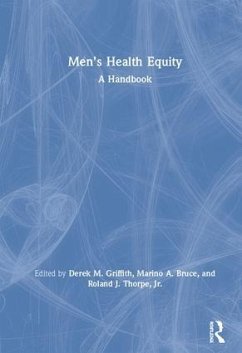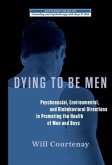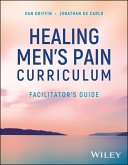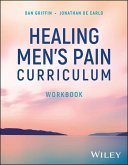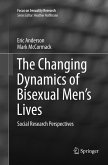Men's Health Equity
A Handbook
Herausgeber: Griffith, Derek M.; Thorpe, Jr. Roland J.; Bruce, Marino A.
Men's Health Equity
A Handbook
Herausgeber: Griffith, Derek M.; Thorpe, Jr. Roland J.; Bruce, Marino A.
- Gebundenes Buch
- Merkliste
- Auf die Merkliste
- Bewerten Bewerten
- Teilen
- Produkt teilen
- Produkterinnerung
- Produkterinnerung
Behavioral, social, and policy interventions to improve the health of the overall population have been less successful in reaching or improving the outcomes of men when compared with women. The field of men's health disparities explores how and why inequalities among men exist and presents evidence informing efforts to improve the health of men and reduce inequalities among them.
Andere Kunden interessierten sich auch für
![Dying to Be Men Dying to Be Men]() Will CourtenayDying to Be Men151,99 €
Will CourtenayDying to Be Men151,99 €![Healing Men's Pain Curriculum, Facilitator's Guide Healing Men's Pain Curriculum, Facilitator's Guide]() Dan GriffinHealing Men's Pain Curriculum, Facilitator's Guide96,99 €
Dan GriffinHealing Men's Pain Curriculum, Facilitator's Guide96,99 €![Talking Men's Health Talking Men's Health]() Caroline FlureyTalking Men's Health104,99 €
Caroline FlureyTalking Men's Health104,99 €![Healing Men's Pain Curriculum, Workbook Healing Men's Pain Curriculum, Workbook]() Dan GriffinHealing Men's Pain Curriculum, Workbook96,99 €
Dan GriffinHealing Men's Pain Curriculum, Workbook96,99 €![Involved Fathering and Men's Adult Development Involved Fathering and Men's Adult Development]() Rob PalkovitzInvolved Fathering and Men's Adult Development170,99 €
Rob PalkovitzInvolved Fathering and Men's Adult Development170,99 €![The Changing Dynamics of Bisexual Men's Lives The Changing Dynamics of Bisexual Men's Lives]() Eric AndersonThe Changing Dynamics of Bisexual Men's Lives82,99 €
Eric AndersonThe Changing Dynamics of Bisexual Men's Lives82,99 €![Being Human Being Human]() Alice Claudia OehningerBeing Human31,99 €
Alice Claudia OehningerBeing Human31,99 €-
-
-
Behavioral, social, and policy interventions to improve the health of the overall population have been less successful in reaching or improving the outcomes of men when compared with women. The field of men's health disparities explores how and why inequalities among men exist and presents evidence informing efforts to improve the health of men and reduce inequalities among them.
Hinweis: Dieser Artikel kann nur an eine deutsche Lieferadresse ausgeliefert werden.
Hinweis: Dieser Artikel kann nur an eine deutsche Lieferadresse ausgeliefert werden.
Produktdetails
- Produktdetails
- Verlag: Routledge
- Seitenzahl: 620
- Erscheinungstermin: 8. Mai 2019
- Englisch
- Abmessung: 260mm x 183mm x 38mm
- Gewicht: 1344g
- ISBN-13: 9781138052963
- ISBN-10: 1138052965
- Artikelnr.: 56850249
- Herstellerkennzeichnung
- Libri GmbH
- Europaallee 1
- 36244 Bad Hersfeld
- gpsr@libri.de
- Verlag: Routledge
- Seitenzahl: 620
- Erscheinungstermin: 8. Mai 2019
- Englisch
- Abmessung: 260mm x 183mm x 38mm
- Gewicht: 1344g
- ISBN-13: 9781138052963
- ISBN-10: 1138052965
- Artikelnr.: 56850249
- Herstellerkennzeichnung
- Libri GmbH
- Europaallee 1
- 36244 Bad Hersfeld
- gpsr@libri.de
Derek M. Griffith, PhD is the Founder and Director of the Center for Research on Men's Health and Professor of Medicine, Health, and Society at Vanderbilt University. His research applies an intersectional approach to explore strategies to eliminate men's health disparities and improve Black and Latino men's health in the United States and the health of men across the globe. Marino A. Bruce, PhD, MSRC, MDiv is Associate Director of the Center for Research on Men's Health, Director of the Program for Research on Faith and Health within the Center, and Research Associate Professor of Medicine, Health, and Society at Vanderbilt University. His research examines religion and spirituality as determinants of health for African American boys and men. Roland J. Thorpe, Jr., PhD is Founding Director of the Program for Research on Men's Health and Associate Professor of Health, Behavior, and Society at Bloomberg School of Public Health. As a social epidemiologist and gerontologist, his research focuses on understanding the biopsychosocial factors that lead to improving the lives of African American men using a life course perspective.
Foreword Preface Acknowledgments Part I: Psychosocial and Developmental Foundations of Men's Health Equity 1. Introduction Derek M. Griffith
PhD
Marino A. Bruce
PhD
MSRC
MDiv
and Roland J. Thorpe
Jr.
PhD 2. Masculinity and Men's Health Disparities: Conceptual and Theoretical Challenges Steve Robertson
PhD
RGN and Lynne Kilvington-Dowd 3. Precarious Manhood for Men's Health and Men's Health Disparities Joseph A. Vandello
PhD
Jennifer K. Bosson
PhD
and Joanna R. Lawler 4. Fatherhood as a Social Context for Reducing Men's Health Disparities: Lessons Learned from the Fathers and Sons Program Cleopatra Howard Caldwell
PhD
Kazumi Tsuchiya
MPH
Shervin Assari
MD
MPH
and Alvin Thomas
PhD 5. Young Adulthood and Health Disparities in African American Males Michael Cunningham
PhD and Antanious White 6. Middle-Aged Men's Health: Patterns and Causes of Health Inequities During a Pivotal Period in the Life Course Derek M. Griffith
PhD
Emily Cornish Jaeger
MPH
Ledric D. Sherman
PhD
MA
and Heath J. Moore
BS 7. Men's Health in Later Life: Diverse and Intersecting Contexts Jamie Mitchell
MSSW
PhD
Julie Ober Allen
PhD
MPH
and Ramona Perry
BA 8. Measuring the Dimensions of African American Manhood: A Factor Analysis Derek M. Griffith
PhD
Jacquelyn S. Pennings
PhD
Marino A. Bruce
PhD
MSRC
MDiv
and Gregory D. Ayers
MS Part II: Environmental
Social
and Policy Determinants of Men's Health Inequities 9. Being a Man in the Countryside: How Rural Men Navigate Health and Masculinity Bradley Hiebert
MSc
PhD
Beverly Leipert
RN
PhD
and Sandra Regan
RN
PhD 10. Urban Men's Health: How Urban Environments Affect Black Men's Health Waldo E. Johnson
Jr.
PhD
MSW 11. Incarceration as Determinant of Poor Health Outcomes Jason M. Williams
PhD and Carrie Bergeson
MS
CFLE 12. The Public Health Disparities of Domestic Violence: Including the Perspectives and Health of Ethnic-Minority Men Rohan D. Jeremiah
PhD and Olubunmi Basirat Oyewowo-Gassikia
PhD
LMSW 13. Global Men's Health Policy Noel Richardson
PhD
James A. Smith
PhD
Steve Robertson
PhD
RGN
and Peter Baker
MA
FRSPH 14. Health
Public
and Social Policy Henrie M. Treadwell
PhD and Marguerite J. Ro
DrPH 15. What Influences Adolescent Black Male Development and Well-Being? Implications of the Limits and Opportunities of Social Policy Keon L. Gilbert
DrPH
MA
MPH
Rashawn J. Ray
PhD
and Odis D. Johnson
PhD Part III: Health Behaviors and Health Outcomes 16. Male Health Behaviors Michael J. Rovito
PhD
CHES
FMHI 17. Considerations in Men's Mental Health Promotion and Treatment Zac E. Seidler
MCP
Simon M. Rice
PhD
John S. Ogrodniczuk
PhD
David Kealy
PhD
Haryana M. Dhillon
PhD
and John L. Oliffe
PhD
MEd
RN 18. Depression
Trauma
and Suicide Among Adolescent and Young Adult Males Michael A. Lindsey
PhD
MSW
MPH and Yunyu Xiao
MPhil 19. Men's Trauma
Depression
and Suicide in Adulthood Daphne C. Watkins
PhD and Janelle R. Goodwill
MSW 20. Cancer Disparities in Men Kelvin A. Moses
MD
PhD
FACS 21. Diabetes Health Disparities in Men: A Brief Review of the Influence of Gender on the Onset and Progression of Diabetes in Men and Implications for Interventions and Practice Jaclynn M. Hawkins
MSW
PhD
Rosalyn Denise Campbell
PhD
LMSW
Charles Graham
LSMW
PhD Part IV: Men's Health Inequities in the United States 22. The Health of Gay and Bisexual Men: Theoretical Approaches and Policy Implications Stephanie H. Cook
DrPH
MPH
Erica P. Wood
MPH
Jason Harris
MPH
Paul D'Avanzo
MS
and Perry N. Halkitis
PhD
MS
MPH 23. Transgender and Intersex Men David A. Rubin
PhD 24. Health Disparities Among Men with Disabilities and Functional Limitations Carlos M. Cervantes
PhD
CAPE and Samuel R. Hodge
PhD 25. Asian American Men's Health: Applications of the Racial-Cultural Framework Y. Joel Wong
PhD
Keiko McCullough
and Kuo Deng 26. Understanding Health Inequalities Experienced by Black Men: Fundamental Links Between Racism
Socioeconomic Position
and Social Mobility Darrell Hudson
PhD
MPH
Andrae Banks
PhD
LCSW
Derek Holland
MPH
and Whitney Sewell 27. Understanding Health and Health Disparities in European American Boys and Men Eric S. Mankowski
PhD and Nick Glover 28. Cultural
Social and Historical Factors Influencing Latino Men's Health Jason Daniel-Ulloa
PhD
India J. Ornelas
and Alejandra Escoto 29. Seeking Health and Well-Being for Indigenous North American Men Arthur W. Blume
PhD 30. Achieving Health Equity for Native Hawaiian Men: Aia I Hea Ka Wai A K¿ne Ka'imi Alohilani Sinclair
PhD and Joseph Keawe'aimoku Kaholokula
PhD Part V: Men's Health Inequities Across the Globe 31. Understanding Inequities in Men's Health in Australia: What Do We Know? James A. Smith
PhD
Murray Drummond
MEd
PhD
Mick Adams
PhD
Jason Bonson
Benjamin Christie 32. Which Men? Inequality
Ethnicity
and Gender in Brazil's National Men's Health Program Gary Barker
PhD
Eduardo Schwarz
and Daniel Costa Lima 33. Picturing Intersectionality in Men's Suicide Research: A Photovoice Case Study of Gay and Bisexual Men Olivier Ferlatte
PhD and John L. Oliffe
PhD
MEd
RN 34. Regional Variation in Determinants of Men's Health: Comparison of South
Central
and North America Shervin Assari
MD
MPH Part VI: Final Thoughts and Future Directions 35. Life Course Perspective: Implications for Men's Health Equity Roland J. Thorpe
Jr.
PhD and Paul C. Archibald
DrPH
LCSW-C 36. Afterword Lisa Bowleg
MA
PhD 37. Conclusion Derek M. Griffith
PhD
Marino A. Bruce
PhD
MDiv
and Roland J. Thorpe
Jr.
PhD
PhD
Marino A. Bruce
PhD
MSRC
MDiv
and Roland J. Thorpe
Jr.
PhD 2. Masculinity and Men's Health Disparities: Conceptual and Theoretical Challenges Steve Robertson
PhD
RGN and Lynne Kilvington-Dowd 3. Precarious Manhood for Men's Health and Men's Health Disparities Joseph A. Vandello
PhD
Jennifer K. Bosson
PhD
and Joanna R. Lawler 4. Fatherhood as a Social Context for Reducing Men's Health Disparities: Lessons Learned from the Fathers and Sons Program Cleopatra Howard Caldwell
PhD
Kazumi Tsuchiya
MPH
Shervin Assari
MD
MPH
and Alvin Thomas
PhD 5. Young Adulthood and Health Disparities in African American Males Michael Cunningham
PhD and Antanious White 6. Middle-Aged Men's Health: Patterns and Causes of Health Inequities During a Pivotal Period in the Life Course Derek M. Griffith
PhD
Emily Cornish Jaeger
MPH
Ledric D. Sherman
PhD
MA
and Heath J. Moore
BS 7. Men's Health in Later Life: Diverse and Intersecting Contexts Jamie Mitchell
MSSW
PhD
Julie Ober Allen
PhD
MPH
and Ramona Perry
BA 8. Measuring the Dimensions of African American Manhood: A Factor Analysis Derek M. Griffith
PhD
Jacquelyn S. Pennings
PhD
Marino A. Bruce
PhD
MSRC
MDiv
and Gregory D. Ayers
MS Part II: Environmental
Social
and Policy Determinants of Men's Health Inequities 9. Being a Man in the Countryside: How Rural Men Navigate Health and Masculinity Bradley Hiebert
MSc
PhD
Beverly Leipert
RN
PhD
and Sandra Regan
RN
PhD 10. Urban Men's Health: How Urban Environments Affect Black Men's Health Waldo E. Johnson
Jr.
PhD
MSW 11. Incarceration as Determinant of Poor Health Outcomes Jason M. Williams
PhD and Carrie Bergeson
MS
CFLE 12. The Public Health Disparities of Domestic Violence: Including the Perspectives and Health of Ethnic-Minority Men Rohan D. Jeremiah
PhD and Olubunmi Basirat Oyewowo-Gassikia
PhD
LMSW 13. Global Men's Health Policy Noel Richardson
PhD
James A. Smith
PhD
Steve Robertson
PhD
RGN
and Peter Baker
MA
FRSPH 14. Health
Public
and Social Policy Henrie M. Treadwell
PhD and Marguerite J. Ro
DrPH 15. What Influences Adolescent Black Male Development and Well-Being? Implications of the Limits and Opportunities of Social Policy Keon L. Gilbert
DrPH
MA
MPH
Rashawn J. Ray
PhD
and Odis D. Johnson
PhD Part III: Health Behaviors and Health Outcomes 16. Male Health Behaviors Michael J. Rovito
PhD
CHES
FMHI 17. Considerations in Men's Mental Health Promotion and Treatment Zac E. Seidler
MCP
Simon M. Rice
PhD
John S. Ogrodniczuk
PhD
David Kealy
PhD
Haryana M. Dhillon
PhD
and John L. Oliffe
PhD
MEd
RN 18. Depression
Trauma
and Suicide Among Adolescent and Young Adult Males Michael A. Lindsey
PhD
MSW
MPH and Yunyu Xiao
MPhil 19. Men's Trauma
Depression
and Suicide in Adulthood Daphne C. Watkins
PhD and Janelle R. Goodwill
MSW 20. Cancer Disparities in Men Kelvin A. Moses
MD
PhD
FACS 21. Diabetes Health Disparities in Men: A Brief Review of the Influence of Gender on the Onset and Progression of Diabetes in Men and Implications for Interventions and Practice Jaclynn M. Hawkins
MSW
PhD
Rosalyn Denise Campbell
PhD
LMSW
Charles Graham
LSMW
PhD Part IV: Men's Health Inequities in the United States 22. The Health of Gay and Bisexual Men: Theoretical Approaches and Policy Implications Stephanie H. Cook
DrPH
MPH
Erica P. Wood
MPH
Jason Harris
MPH
Paul D'Avanzo
MS
and Perry N. Halkitis
PhD
MS
MPH 23. Transgender and Intersex Men David A. Rubin
PhD 24. Health Disparities Among Men with Disabilities and Functional Limitations Carlos M. Cervantes
PhD
CAPE and Samuel R. Hodge
PhD 25. Asian American Men's Health: Applications of the Racial-Cultural Framework Y. Joel Wong
PhD
Keiko McCullough
and Kuo Deng 26. Understanding Health Inequalities Experienced by Black Men: Fundamental Links Between Racism
Socioeconomic Position
and Social Mobility Darrell Hudson
PhD
MPH
Andrae Banks
PhD
LCSW
Derek Holland
MPH
and Whitney Sewell 27. Understanding Health and Health Disparities in European American Boys and Men Eric S. Mankowski
PhD and Nick Glover 28. Cultural
Social and Historical Factors Influencing Latino Men's Health Jason Daniel-Ulloa
PhD
India J. Ornelas
and Alejandra Escoto 29. Seeking Health and Well-Being for Indigenous North American Men Arthur W. Blume
PhD 30. Achieving Health Equity for Native Hawaiian Men: Aia I Hea Ka Wai A K¿ne Ka'imi Alohilani Sinclair
PhD and Joseph Keawe'aimoku Kaholokula
PhD Part V: Men's Health Inequities Across the Globe 31. Understanding Inequities in Men's Health in Australia: What Do We Know? James A. Smith
PhD
Murray Drummond
MEd
PhD
Mick Adams
PhD
Jason Bonson
Benjamin Christie 32. Which Men? Inequality
Ethnicity
and Gender in Brazil's National Men's Health Program Gary Barker
PhD
Eduardo Schwarz
and Daniel Costa Lima 33. Picturing Intersectionality in Men's Suicide Research: A Photovoice Case Study of Gay and Bisexual Men Olivier Ferlatte
PhD and John L. Oliffe
PhD
MEd
RN 34. Regional Variation in Determinants of Men's Health: Comparison of South
Central
and North America Shervin Assari
MD
MPH Part VI: Final Thoughts and Future Directions 35. Life Course Perspective: Implications for Men's Health Equity Roland J. Thorpe
Jr.
PhD and Paul C. Archibald
DrPH
LCSW-C 36. Afterword Lisa Bowleg
MA
PhD 37. Conclusion Derek M. Griffith
PhD
Marino A. Bruce
PhD
MDiv
and Roland J. Thorpe
Jr.
PhD
Foreword Preface Acknowledgments Part I: Psychosocial and Developmental Foundations of Men's Health Equity 1. Introduction Derek M. Griffith
PhD
Marino A. Bruce
PhD
MSRC
MDiv
and Roland J. Thorpe
Jr.
PhD 2. Masculinity and Men's Health Disparities: Conceptual and Theoretical Challenges Steve Robertson
PhD
RGN and Lynne Kilvington-Dowd 3. Precarious Manhood for Men's Health and Men's Health Disparities Joseph A. Vandello
PhD
Jennifer K. Bosson
PhD
and Joanna R. Lawler 4. Fatherhood as a Social Context for Reducing Men's Health Disparities: Lessons Learned from the Fathers and Sons Program Cleopatra Howard Caldwell
PhD
Kazumi Tsuchiya
MPH
Shervin Assari
MD
MPH
and Alvin Thomas
PhD 5. Young Adulthood and Health Disparities in African American Males Michael Cunningham
PhD and Antanious White 6. Middle-Aged Men's Health: Patterns and Causes of Health Inequities During a Pivotal Period in the Life Course Derek M. Griffith
PhD
Emily Cornish Jaeger
MPH
Ledric D. Sherman
PhD
MA
and Heath J. Moore
BS 7. Men's Health in Later Life: Diverse and Intersecting Contexts Jamie Mitchell
MSSW
PhD
Julie Ober Allen
PhD
MPH
and Ramona Perry
BA 8. Measuring the Dimensions of African American Manhood: A Factor Analysis Derek M. Griffith
PhD
Jacquelyn S. Pennings
PhD
Marino A. Bruce
PhD
MSRC
MDiv
and Gregory D. Ayers
MS Part II: Environmental
Social
and Policy Determinants of Men's Health Inequities 9. Being a Man in the Countryside: How Rural Men Navigate Health and Masculinity Bradley Hiebert
MSc
PhD
Beverly Leipert
RN
PhD
and Sandra Regan
RN
PhD 10. Urban Men's Health: How Urban Environments Affect Black Men's Health Waldo E. Johnson
Jr.
PhD
MSW 11. Incarceration as Determinant of Poor Health Outcomes Jason M. Williams
PhD and Carrie Bergeson
MS
CFLE 12. The Public Health Disparities of Domestic Violence: Including the Perspectives and Health of Ethnic-Minority Men Rohan D. Jeremiah
PhD and Olubunmi Basirat Oyewowo-Gassikia
PhD
LMSW 13. Global Men's Health Policy Noel Richardson
PhD
James A. Smith
PhD
Steve Robertson
PhD
RGN
and Peter Baker
MA
FRSPH 14. Health
Public
and Social Policy Henrie M. Treadwell
PhD and Marguerite J. Ro
DrPH 15. What Influences Adolescent Black Male Development and Well-Being? Implications of the Limits and Opportunities of Social Policy Keon L. Gilbert
DrPH
MA
MPH
Rashawn J. Ray
PhD
and Odis D. Johnson
PhD Part III: Health Behaviors and Health Outcomes 16. Male Health Behaviors Michael J. Rovito
PhD
CHES
FMHI 17. Considerations in Men's Mental Health Promotion and Treatment Zac E. Seidler
MCP
Simon M. Rice
PhD
John S. Ogrodniczuk
PhD
David Kealy
PhD
Haryana M. Dhillon
PhD
and John L. Oliffe
PhD
MEd
RN 18. Depression
Trauma
and Suicide Among Adolescent and Young Adult Males Michael A. Lindsey
PhD
MSW
MPH and Yunyu Xiao
MPhil 19. Men's Trauma
Depression
and Suicide in Adulthood Daphne C. Watkins
PhD and Janelle R. Goodwill
MSW 20. Cancer Disparities in Men Kelvin A. Moses
MD
PhD
FACS 21. Diabetes Health Disparities in Men: A Brief Review of the Influence of Gender on the Onset and Progression of Diabetes in Men and Implications for Interventions and Practice Jaclynn M. Hawkins
MSW
PhD
Rosalyn Denise Campbell
PhD
LMSW
Charles Graham
LSMW
PhD Part IV: Men's Health Inequities in the United States 22. The Health of Gay and Bisexual Men: Theoretical Approaches and Policy Implications Stephanie H. Cook
DrPH
MPH
Erica P. Wood
MPH
Jason Harris
MPH
Paul D'Avanzo
MS
and Perry N. Halkitis
PhD
MS
MPH 23. Transgender and Intersex Men David A. Rubin
PhD 24. Health Disparities Among Men with Disabilities and Functional Limitations Carlos M. Cervantes
PhD
CAPE and Samuel R. Hodge
PhD 25. Asian American Men's Health: Applications of the Racial-Cultural Framework Y. Joel Wong
PhD
Keiko McCullough
and Kuo Deng 26. Understanding Health Inequalities Experienced by Black Men: Fundamental Links Between Racism
Socioeconomic Position
and Social Mobility Darrell Hudson
PhD
MPH
Andrae Banks
PhD
LCSW
Derek Holland
MPH
and Whitney Sewell 27. Understanding Health and Health Disparities in European American Boys and Men Eric S. Mankowski
PhD and Nick Glover 28. Cultural
Social and Historical Factors Influencing Latino Men's Health Jason Daniel-Ulloa
PhD
India J. Ornelas
and Alejandra Escoto 29. Seeking Health and Well-Being for Indigenous North American Men Arthur W. Blume
PhD 30. Achieving Health Equity for Native Hawaiian Men: Aia I Hea Ka Wai A K¿ne Ka'imi Alohilani Sinclair
PhD and Joseph Keawe'aimoku Kaholokula
PhD Part V: Men's Health Inequities Across the Globe 31. Understanding Inequities in Men's Health in Australia: What Do We Know? James A. Smith
PhD
Murray Drummond
MEd
PhD
Mick Adams
PhD
Jason Bonson
Benjamin Christie 32. Which Men? Inequality
Ethnicity
and Gender in Brazil's National Men's Health Program Gary Barker
PhD
Eduardo Schwarz
and Daniel Costa Lima 33. Picturing Intersectionality in Men's Suicide Research: A Photovoice Case Study of Gay and Bisexual Men Olivier Ferlatte
PhD and John L. Oliffe
PhD
MEd
RN 34. Regional Variation in Determinants of Men's Health: Comparison of South
Central
and North America Shervin Assari
MD
MPH Part VI: Final Thoughts and Future Directions 35. Life Course Perspective: Implications for Men's Health Equity Roland J. Thorpe
Jr.
PhD and Paul C. Archibald
DrPH
LCSW-C 36. Afterword Lisa Bowleg
MA
PhD 37. Conclusion Derek M. Griffith
PhD
Marino A. Bruce
PhD
MDiv
and Roland J. Thorpe
Jr.
PhD
PhD
Marino A. Bruce
PhD
MSRC
MDiv
and Roland J. Thorpe
Jr.
PhD 2. Masculinity and Men's Health Disparities: Conceptual and Theoretical Challenges Steve Robertson
PhD
RGN and Lynne Kilvington-Dowd 3. Precarious Manhood for Men's Health and Men's Health Disparities Joseph A. Vandello
PhD
Jennifer K. Bosson
PhD
and Joanna R. Lawler 4. Fatherhood as a Social Context for Reducing Men's Health Disparities: Lessons Learned from the Fathers and Sons Program Cleopatra Howard Caldwell
PhD
Kazumi Tsuchiya
MPH
Shervin Assari
MD
MPH
and Alvin Thomas
PhD 5. Young Adulthood and Health Disparities in African American Males Michael Cunningham
PhD and Antanious White 6. Middle-Aged Men's Health: Patterns and Causes of Health Inequities During a Pivotal Period in the Life Course Derek M. Griffith
PhD
Emily Cornish Jaeger
MPH
Ledric D. Sherman
PhD
MA
and Heath J. Moore
BS 7. Men's Health in Later Life: Diverse and Intersecting Contexts Jamie Mitchell
MSSW
PhD
Julie Ober Allen
PhD
MPH
and Ramona Perry
BA 8. Measuring the Dimensions of African American Manhood: A Factor Analysis Derek M. Griffith
PhD
Jacquelyn S. Pennings
PhD
Marino A. Bruce
PhD
MSRC
MDiv
and Gregory D. Ayers
MS Part II: Environmental
Social
and Policy Determinants of Men's Health Inequities 9. Being a Man in the Countryside: How Rural Men Navigate Health and Masculinity Bradley Hiebert
MSc
PhD
Beverly Leipert
RN
PhD
and Sandra Regan
RN
PhD 10. Urban Men's Health: How Urban Environments Affect Black Men's Health Waldo E. Johnson
Jr.
PhD
MSW 11. Incarceration as Determinant of Poor Health Outcomes Jason M. Williams
PhD and Carrie Bergeson
MS
CFLE 12. The Public Health Disparities of Domestic Violence: Including the Perspectives and Health of Ethnic-Minority Men Rohan D. Jeremiah
PhD and Olubunmi Basirat Oyewowo-Gassikia
PhD
LMSW 13. Global Men's Health Policy Noel Richardson
PhD
James A. Smith
PhD
Steve Robertson
PhD
RGN
and Peter Baker
MA
FRSPH 14. Health
Public
and Social Policy Henrie M. Treadwell
PhD and Marguerite J. Ro
DrPH 15. What Influences Adolescent Black Male Development and Well-Being? Implications of the Limits and Opportunities of Social Policy Keon L. Gilbert
DrPH
MA
MPH
Rashawn J. Ray
PhD
and Odis D. Johnson
PhD Part III: Health Behaviors and Health Outcomes 16. Male Health Behaviors Michael J. Rovito
PhD
CHES
FMHI 17. Considerations in Men's Mental Health Promotion and Treatment Zac E. Seidler
MCP
Simon M. Rice
PhD
John S. Ogrodniczuk
PhD
David Kealy
PhD
Haryana M. Dhillon
PhD
and John L. Oliffe
PhD
MEd
RN 18. Depression
Trauma
and Suicide Among Adolescent and Young Adult Males Michael A. Lindsey
PhD
MSW
MPH and Yunyu Xiao
MPhil 19. Men's Trauma
Depression
and Suicide in Adulthood Daphne C. Watkins
PhD and Janelle R. Goodwill
MSW 20. Cancer Disparities in Men Kelvin A. Moses
MD
PhD
FACS 21. Diabetes Health Disparities in Men: A Brief Review of the Influence of Gender on the Onset and Progression of Diabetes in Men and Implications for Interventions and Practice Jaclynn M. Hawkins
MSW
PhD
Rosalyn Denise Campbell
PhD
LMSW
Charles Graham
LSMW
PhD Part IV: Men's Health Inequities in the United States 22. The Health of Gay and Bisexual Men: Theoretical Approaches and Policy Implications Stephanie H. Cook
DrPH
MPH
Erica P. Wood
MPH
Jason Harris
MPH
Paul D'Avanzo
MS
and Perry N. Halkitis
PhD
MS
MPH 23. Transgender and Intersex Men David A. Rubin
PhD 24. Health Disparities Among Men with Disabilities and Functional Limitations Carlos M. Cervantes
PhD
CAPE and Samuel R. Hodge
PhD 25. Asian American Men's Health: Applications of the Racial-Cultural Framework Y. Joel Wong
PhD
Keiko McCullough
and Kuo Deng 26. Understanding Health Inequalities Experienced by Black Men: Fundamental Links Between Racism
Socioeconomic Position
and Social Mobility Darrell Hudson
PhD
MPH
Andrae Banks
PhD
LCSW
Derek Holland
MPH
and Whitney Sewell 27. Understanding Health and Health Disparities in European American Boys and Men Eric S. Mankowski
PhD and Nick Glover 28. Cultural
Social and Historical Factors Influencing Latino Men's Health Jason Daniel-Ulloa
PhD
India J. Ornelas
and Alejandra Escoto 29. Seeking Health and Well-Being for Indigenous North American Men Arthur W. Blume
PhD 30. Achieving Health Equity for Native Hawaiian Men: Aia I Hea Ka Wai A K¿ne Ka'imi Alohilani Sinclair
PhD and Joseph Keawe'aimoku Kaholokula
PhD Part V: Men's Health Inequities Across the Globe 31. Understanding Inequities in Men's Health in Australia: What Do We Know? James A. Smith
PhD
Murray Drummond
MEd
PhD
Mick Adams
PhD
Jason Bonson
Benjamin Christie 32. Which Men? Inequality
Ethnicity
and Gender in Brazil's National Men's Health Program Gary Barker
PhD
Eduardo Schwarz
and Daniel Costa Lima 33. Picturing Intersectionality in Men's Suicide Research: A Photovoice Case Study of Gay and Bisexual Men Olivier Ferlatte
PhD and John L. Oliffe
PhD
MEd
RN 34. Regional Variation in Determinants of Men's Health: Comparison of South
Central
and North America Shervin Assari
MD
MPH Part VI: Final Thoughts and Future Directions 35. Life Course Perspective: Implications for Men's Health Equity Roland J. Thorpe
Jr.
PhD and Paul C. Archibald
DrPH
LCSW-C 36. Afterword Lisa Bowleg
MA
PhD 37. Conclusion Derek M. Griffith
PhD
Marino A. Bruce
PhD
MDiv
and Roland J. Thorpe
Jr.
PhD

